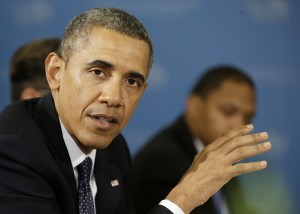
In this Sept. 6, 2013, file photo, President Barack Obama speaks in St. Petersburg, Russia. Obama is going all out to convince war-weary Americans that limited strikes against Syria are needed for the long-term safety of the United States. AP PHOTO/PABLO MARTINEZ MONSIVAIS
WASHINGTON—US President Barack Obama is going all out to convince war-weary Americans that limited strikes against Syria are needed for the long-term safety of the United States, while his national security team is attempting to reassure skeptical lawmakers that the administration is not heading toward another Iraq or Afghanistan.
Obama on Monday planned to make his case for punishing Syrian President Bashar Assad for turning chemical weapons against his own people—a charge Assad denies in a new interview. Top administration officials are heading to Capitol Hill for more classified briefings, and White House National Security Adviser Susan Rice is scheduled for a speech at a Washington think tank timed to the public relations blitz.
Obama will meet with Senate Democrats on Tuesday to seek support for US military action against the government of Syria, according to two Senate Democratic aides. The meeting at the Capitol would come just hours before Obama addresses the nation in a prime-time speech on Syria from the White House.
With Congress set to have its first votes authorizing limited strikes into Syria as soon as Wednesday, Obama and his allies were arguing that the United States needs to remind hostile nations such as Iran and North Korea of American military might while working to reassure the nation that the lessons of the last decade were fresh in their minds.
“It is not Iraq, Afghanistan or Libya,” White House Chief of Staff Denis McDonough said on Sunday during one of his five network television interviews. “This is a very concerned, concentrated, limited effort that we can carry out and that can underscore and secure our interests.”
But McDonough conceded the administration lacked “irrefutable, beyond-a-reasonable-doubt evidence” that skeptical Americans, including lawmakers who would start voting on military action this week, were seeking.
“It’s an uphill slog,” said Rep. Mike Rogers, the Republican chair of the House intelligence committee, who supported strikes on Assad.
“I think it’s very clear he’s lost support in the last week,” Rogers added, speaking of the president.
A survey by The Associated Press shows that House members who are staking out positions are either opposed to or leaning against Obama’s plan for a military strike by more than a 6-1 margin.
“Lobbing a few Tomahawk missiles will not restore our credibility overseas,” said Rep. Mike McCaul, the Texas Republican who chairs the House homeland security committee.
Added Democratic Rep. Loretta Sanchez: “For the president to say that this is just a very quick thing and we’re out of there, that’s how long wars start.”
Despite public backing from leaders of both parties to strike, almost half of the 433 current members in the House and a third of the 100-member Senate remain undecided, the AP survey found.
These lawmakers will be the subject of intense lobbying from the administration—as well as outside groups that have formed coalitions that defy the traditional left-right divide.
Public opinion surveys show intense American skepticism about military intervention in Syria, even among those who believe Syria’s government used chemical weapons on its people.
No conclusive evidence
The United States, citing intelligence reports, says the lethal nerve agent sarin was used in an Aug. 21 attack outside Damascus, and that 1,429 people died, including 426 children.
In an interview on Sunday in Damascus, Assad told American journalist Charlie Rose there was no conclusive evidence about who was to blame for the chemical weapons attacks and again suggested the rebels were responsible.
Rose said Assad also warned him that previous US military efforts in the region had proved disastrous.
Excerpts of Rose’s interview are to be released on Monday on the CBS morning program that he hosts. The full interview is set to air on Rose’s prime-time program on PBS.
Even before the interview was released, the White House criticized Assad’s stance.
“It doesn’t surprise us that someone who would kill thousands of his own people, including hundreds of children with poison gas, would also lie about it,” said White House spokesperson Bernadette Meehan.
Top administration officials, including US Secretary of State John Kerry, Defense Secretary Chuck Hagel and US Ambassador to the United Nations Samantha Power, planned to brief lawmakers ahead of the Wednesday vote on a resolution that would authorize the “limited and specified use” of US armed forces against Syria for no more than 90 days.
Option for Assad
The measure bars American ground troops from combat. A final vote is expected at week’s end and the House is expected to take up the issue the following week.
In London, Kerry said Assad could resolve the crisis surrounding a chemical weapons attack simply by turning over “every single bit” of his weapons stock to the international community within a week.
But Kerry, holding a news conference in London with British counterpart William Hague on Monday, said he believed Assad “isn’t about to do that.”
Kerry was asked about comments that Assad made to Rose in which Assad said there was no conclusive evidence about who was to blame for the chemical weapons attack.
Asked about Assad’s denial, Kerry said, “I just gave you real evidence.”
The secretary of state said, “We know that his regime gave orders to prepare for a chemical attack. We know they deployed forces.”